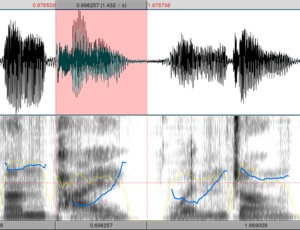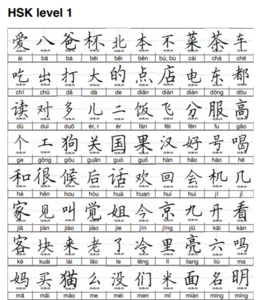Hacking Chinese Resources
Click one or more tags to show relevant resources. Follow @ChineseLinks on Twitter, to get notified about new resources!
Filter
128 resources found.
Focusing on tone pairs to improve your Mandarin pronunciation
When learning to pronounce tones in Chinese, it makes sense to focus on words rather than single syllables. Most words in Chinese are disyllabic and since practising these will also include to tone... Read more.
hackingchinese.com

Olle Linge – over 11 years
Jun Da: Chinese text computing
This site by Jun Da contains a lot of very interesting resources for anyone who wants dig deeper into frequency lists. One set of data I haven't found anywhere else is a frequency list of syllables... Read more.
lingua.mtsu.edu

Olle Linge – about 11 years
WaiChinese
Listen to native speakers, mimic the audio while recording, receive instant feedback on spoken phases. Then submit your recording to be evaluated by real native teachers. Read more.
waichinese.com

电猫 – over 10 years
How to Learn Chinese Faster: Capacity Management
This is the second article I’ve written for FluentU and it’s focused on the topic of capacity management. The main ideas here are not limited to language learning, actually, but is part of the much... Read more.
fluentu.com

Olle Linge – over 11 years
Toward Better Tones in Natural Speech
This article describes the basics of way to teach tones that is different from the traditional way mainly in that the third tone is no longer described as a falling-rising tone (since that is rarel... Read more.
sinosplice.com

Olle Linge – over 11 years
Learning the third tone in Chinese (Hacking Chinese)
The third tone is an essentially low tone. The only time it's pronounced with a high element is in front of another third tone (when it turns into a second tone) and when in complete isolation (whi... Read more.
hackingchinese.com

Olle Linge – over 10 years
How to find more time to practise listening (Hacking Chinese)
When it comes to learning to understand spoken Chinese, there are few shortcuts. The more you listen, the more you will understand. But how can we fit more listening into our lives without cutting ... Read more.
hackingchinese.com

Olle Linge – over 10 years
Phonetic components, part 2: Hacking Chinese characters
This is the second and final article about using phonetic components to hack Chinese characters and make it considerably easier to handle similarly looking characters. This article describes both t... Read more.
hackingchinese.com

Olle Linge – almost 11 years
How to learn Chinese characters as a beginner (Hacking Chinese)
Writing Chinese characters for the first time can be very hard, mostly because it's so different from writing letters. It feels more like drawing a picture than writing! This article is aimed at be... Read more.
hackingchinese.com

Olle Linge – about 11 years
How to Approach Chinese Grammar
In this article John Pasden discusses how to approach Chinese grammar as a foreigner, starting by debunking a few myths and then going on to how to actually learn grammar. Chinese is a language whe... Read more.
hackingchinese.com

Olle Linge – about 11 years
Chineasy? Not (About what's wrong with Hsueh ShaoLan's Chineasy)
In this blog post, Victor Mair explains what's wrong withe Hsueh ShaoLan's claims that learning to read and write Chinese is easy. That this is wrong should be pretty easy, but few can say it with ... Read more.
languagelog.ldc.upenn.edu

Olle Linge – over 11 years
Easing yourself into reading novels in Chinese
Reading a novel in Chinese is the goal for many learners, but perhaps it's easier to accomplish than you think. This article discusses various methods of making novel reading easier in Chinese, ma... Read more.
hackingchinese.com

Olle Linge – over 11 years
Chinese character stroke order rules (Understanding Chinese Characters on YouTube)
This is a basic video demonstration of the stroke order rules for writing Chinese characters. It's short and if you find something lacking, your question may have already been answered in the comme... Read more.
youtube.com

Olle Linge – over 10 years
Mandarin Chinese Count/Measure Words (digchinese.com)
This is a comprehensive overview of measure words in Chinese, featuring a long list of the most common ones, an explanation in English how they are used and a number of examples of words they are u... Read more.
digchinese.com

Olle Linge – over 10 years
Using Audacity to learn Chinese (speaking and listening) (Hacking Chinese)
Audacity is a marvellous piece of software that allows you to record audio (yourself, other people or whatever is playing on your computer), mimic native speakers, edit and enhance the audio, as we... Read more.
hackingchinese.com

Olle Linge – over 10 years
Immersion at home or: Why you don’t have to go abroad to learn Chinese (Hacking Chinese)
You don't have to go abroad to learn Chinese. The main difference between staying at home and going abroad is that it requires less effort to learn once you're there (although it still requires qui... Read more.
hackingchinese.com

Olle Linge – almost 11 years
Learning the right chengyu the right way (Hacking Chinese)
Many people regard chengyu as the golden key to the Chinese language and believe that learning chengyu will impress native speakers and take their Chinese to the next level. However, learning cheng... Read more.
hackingchinese.com

Olle Linge – almost 11 years
7 ways of learning to write Chinese characters (Hacking Chinese)
There are many ways of practising writing Chinese characters and they all have their pros and cons. In this article, I discuss seven different ways of practising and what advantages and disadvantag... Read more.
hackingchinese.com

Olle Linge – almost 11 years
Phonetic components, part 1: The key to 80% of all Chinese characters
80% of all Chinese characters are made up of one semantic component (meaning) and one phonetic component (pronunciation). The sheer number of characters formed this way means that these characters ... Read more.
hackingchinese.com

Olle Linge – almost 11 years
East Asia Student - A Blog About Random Stuff Related to East Asia
This is Hugh Grigg's site about his East Asia studies (as the title implies). Even though the site is about all East Asia, I think most posts are still about Chinese in some way, including a large ... Read more.
eastasiastudent.net

Olle Linge – about 11 years
How and why to use television to learn Chinese
Television is a valuable asset in the modern language learners toolkit. The medium provides a convenient way to enjoy large volumes of passive listening practice in a stress free environment. The c... Read more.
hackingchinese.com

Olle Linge – about 11 years
Handwriting Chinese characters: The minimum requirements
This is a guide to handwriting Chinese characters. It's not about writing beautifully, but writing correctly, including things like stroke placement, length and direction. There are numerous exampl... Read more.
hackingchinese.com

Olle Linge – about 11 years
Learn to read Chinese… with ease?
Is it easy to learn to read Chinese? ShaoLan, among others, claims that it is. I don't agree, and in this article I discuss some common trends among people who try to portray Chinese as being easy.... Read more.
hackingchinese.com

Olle Linge – about 11 years
Chinese Listening Practice: Why and How to Get Started
This article focuses on listening ability and is fairly comprehensive. I have written about most of this before on Hacking Chinese, but this is a better overview than anything else I’ve written pre... Read more.
fluentu.com

Olle Linge – over 11 years
Learning how to fish: Or, why it’s essential to know how to learn
Good pronunciation matters, whether you like it or not. In general, students (and teachers) tend to stop caring about pronunciation much earlier than they should. You don't need to aim for native-l... Read more.
hackingchinese.com

Olle Linge – over 11 years
A language learner’s guide to wuxia novels
Wuxia can be used as a key to both Chinese language and culture. This article is meant to be a guide to second language learners. If you want to read wuxia in Chinese, where do you start? How do yo... Read more.
hackingchinese.com

Olle Linge – over 11 years
The Hacking Chinese Podcast
The Hacking Chinese podcast is about how to learn Mandarin, with in-depth discussions about how to approach challenges, solve problems and get the most out of your learning. Currently available ... Read more.
hackingchinese.com

Olle Linge – over 4 years
Handwriting samples for the HSK curriculum
This resource presents something fairly unique: handwriting samples from a famous calligrapher (田英章) for all characters in HSK, sorted by level. This includes both regular script (楷书) and semi-curs... Read more.
edsko.net

Olle Linge – over 5 years
Spaced repetition - Efficient memorization & what it's good for (Gwern.net)
This is the best overview of spaced repetition research I have seen online or offline. It's thorough, well-argued and probably covers more than you were looking for. It's not specifically about Chi... Read more.
gwern.net

Olle Linge – over 9 years
Process of creating a Chinese font
Just you try designing 13,000-plus intricate character shapes that all have to balance one another. Read more.
qz.com

stefanwienert – over 9 years
Hacking Chinese: A Practical Guide to Learning Mandarin (video/Audio/Text course)
Through video, text and audio, this course helps you become a better language learner. It also explains many Chinese-specific learning strategies necessary to avoid wasting lots of time or missing ... Read more.
hackingchinese.com

Olle Linge – over 9 years
Is it necessary to learn to write Chinese characters by hand? (Hacking Chinese)
Written Chinese characters are regarded by some as the true essence of Chinese; without learning to write by hand, you're not learning Chinese. Others go to extremes in the other direction, claimin... Read more.
hackingchinese.com

Olle Linge – over 9 years
Easy ways to have Chinese conversations in China (Chinese Forums)
This entire thread contains excellent suggestions for how to have good conversations for language practice in China, even if you're an introvert learner. I have tried several of these myself, not b... Read more.
chinese-forums.com

Olle Linge – about 10 years
How to find more time learning a language
In this article, I discuss the main problem for most language learners: how to find the time to learn. It doesn't matter how good your method is if you don't use it, anything multiplied by zero is ... Read more.
blogs.transparent.com
Olle Linge – about 10 years
Outlier Linguistic Solutions (blog about etymology and characters)
Outlier Linguistics hosts an excellent blog with a large number of insightful articles into Chinese characters. Some of them are directly useful because they talk about learning characters, others ... Read more.
outlier-linguistics.com

Olle Linge – about 10 years
The new paperless revolution in Chinese reading
This is an article by David Moser about the incredible changes the digital age has brought to learners of Chinese all over the world. After providing a background for those who started learning Chi... Read more.
hackingchinese.com

Olle Linge – over 10 years
Pinyin Joe's Chinese Computing Help Desk (Windows, Ubuntu Linux, smartphones, macros and more)
User-friendly advice on MS Windows, Ubuntu Linux and smartphone Chinese setup, Chinese input methods (IME), Chinese fonts and Chinese Language Packs (MUIs), plus free downloads for MS Office, a sur... Read more.
pinyinjoe.com

Olle Linge – over 10 years
Tones are more important than you think (Hacking Chinese)
Tones are more important than most people think. Just because native speakers reduce tones and speak quickly, it doesn't mean that you can do the same and get away with it. Don't be fooled by peopl... Read more.
hackingchinese.com

Olle Linge – over 10 years
A guide to Pinyin traps and pitfalls (Hacking Chinese)
My article about various common problems students have with Pinyin. These problems mostly exist because people read Pinyin as if it were a phonetic alphabet instead of a transcription system. Read more.
hackingchinese.com

Olle Linge – over 10 years
How every Chinese province really got its name
The stories behind the names of all of China's provinces and autonomous regions. Read more.
online.thatsmags.com

stefanwienert – over 10 years
A language learner’s guide to reading comics in Chinese (Hacking Chinese)
This article is a guide to reading comics in Chinese, suitable for beginners as well as those who already have some experience. Reading comics is an excellent way of attacking the Great Wall of Chi... Read more.
hackingchinese.com

Olle Linge – over 10 years
Chinese Hacks (Tips, Tricks, Hacks, Software and Websites to make learning Chinese easier)
Chinese Hacks is run by Dave Flynn and might look similar to Hacking Chinese at first glance, but actually isn't. Most of the articles on Chinese Hacks are about software, apps or other tools for l... Read more.
chinesehacks.com

Olle Linge – over 10 years
Studying Chinese when your grades matter (Hacking Chinese)
Ideally, we would study Chinese just because we want to and in any manner we see fit, but this isn't how it works for most students. Instead, we need to care about tests and grades, an extra layer ... Read more.
hackingchinese.com

Olle Linge – almost 11 years
Asking the experts: How to bridge the gap to real Chinese (Hacking Chinese)
Many students of Chinese think that it's hard to bridge the gap from textbook Chinese to the Chinese used by native speakers in the real world. This article contains useful insights and hands-on ad... Read more.
hackingchinese.com

Olle Linge – almost 11 years
Introduction to Chinese Characters (Video by ABCsof Chinese)
This is a neat video that introduces Chinese characters to complete beginners. It's not a substitute for a real lecture on how characters work, but this is still the best introduction I have seen s... Read more.
youtube.com

Olle Linge – almost 11 years
Taiwanese Mandarin (Wikipedia)
This article is an excellent start for anyone who wants to know more about the Mandarin spoken in Taiwan. In general, it's very similar to the Chinese spoken on the Mainland and most Taiwanese peop... Read more.
en.wikipedia.org

Olle Linge – almost 11 years
Mandarin Chinese Phonetics (Zein.se)
This is a simple and straightforward explanation of Chinese phonetics. I recommend it because it's not very complicated and (mostly) correct. I will try to write something myself later, but in the ... Read more.
zein.se

Olle Linge – almost 11 years
Language Log » Victor Mair
Language Log is an excellent blog where ~20 authors share their thoughts about languages and related topics. While the other authors also post interesting articles, I have chosen to link directly t... Read more.
languagelog.ldc.upenn.edu

Olle Linge – almost 11 years
Character Pop
Explode Chinese characters into their building blocks; visualize and remember how they are formed. Read more.
characterpop.com

stefanwienert – about 11 years
How and why to watch the world cup in Chinese (Hacking Chinese)
If you're going to watch the world cup, do it in Chinese! Watching sports is an awesome way of learning a language, almost regardless of which level you're at. As a beginner, you can follow what's ... Read more.
hackingchinese.com

Olle Linge – about 11 years
10 Inspiring Chinese Proverbs for Chinese Learners
Want to learn about Chinese proverbs? Here are detailed explanations of 10 Chinese proverbs that will inspire you. Read more.
fluentu.com

Alan – about 11 years
A learner’s guide to TV shows in Chinese, part 1 (Hacking Chinese)
After having talked about how and why to use television to learn Chinese, it's time to look at actual genres and programmes and see how these can help a language learner improve his or her skills. ... Read more.
hackingchinese.com

Olle Linge – about 11 years
How to find out how good your Chinese pronunciation really is
Evaluating pronunciation needn't be hard, but many methods commonly used by teachers are deeply flawed, resulting in inaccurate error analysis. If we want to improve, we need to be clear about what... Read more.
hackingchinese.com

Olle Linge – about 11 years
The future of Chinese language learning is now (about handwriting and romanised text) (Language Log)
In this blog post, Victor Mair discusses the relative (un)importance of learning to write large numbers of characters by hand (especially for beginners) and the impact of technology for learners of... Read more.
languagelog.ldc.upenn.edu

Olle Linge – over 11 years